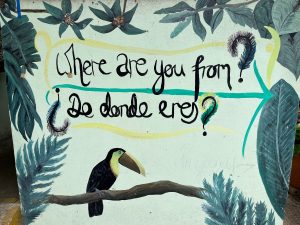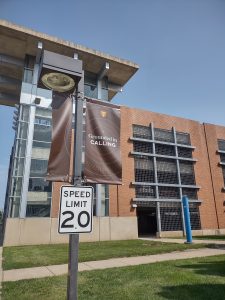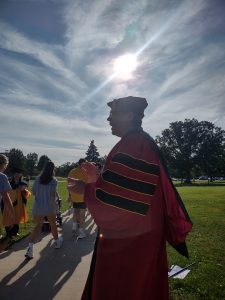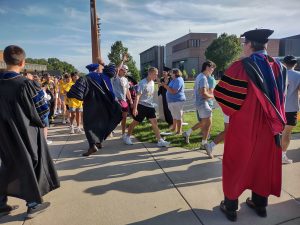 I would like to invite you into a journaling activity this week. We at the Institute for Leadership and Service like to promote reflection. We think of it as a muscle we can exercise. You know, how strong muscles are just kind of “nice to have” until one day when you need to move a couch or pick up a child, and then those muscles become absolutely necessary. Similarly, reflection may seem superfluous, until the day we kind of just need to know what we think about a subject.
I would like to invite you into a journaling activity this week. We at the Institute for Leadership and Service like to promote reflection. We think of it as a muscle we can exercise. You know, how strong muscles are just kind of “nice to have” until one day when you need to move a couch or pick up a child, and then those muscles become absolutely necessary. Similarly, reflection may seem superfluous, until the day we kind of just need to know what we think about a subject.
OK, the reflection activity. Get out a writing instrument and your journal, or a piece of paper, or the back of a napkin.
First, write down where you are from. You decide if that means, city, state, country, etc, but I mean a geographical place.
Next, think of something about that place that is meaningful to you. Spend a little time describing it in writing. Is it a place in your hometown? The waterfall? Is it the public pool? Is it the weather? The way the sunset in August looks? What does this element of home look like? Feel like? Smell like?
Finally, write down why it is meaningful to you.
Now stop. Did you do it? Even if you’re not writing, imagine in your mind’s eye before you continue reading.
Mine is a ponderosa pine tree (smells like vanilla) next to the family cabin in the Black Hills of South Dakota. More specifically, the day I was contemplating the age of the trees and the mountains, and spotted a rose-breasted grosbeak bird perched on one of the branches.
OK, now let’s think about our calling for a minute, our vocation(s). One set of questions for thinking about calling is: “Who am I, and how do I show up in the world?” Or, “How do I understand the world around me, and my place in it?”
Sometimes we think of these vocational questions as very metaphorical or philosophical questions. I want to take a step back and make sure that we ground our philosophical/theological questions in the actual material world for a minute:
How do I survive? Where does my food come from? Where does my water and energy come from? What is the soil under my feet and the land use capacity of this area? What temperate zone are we in?
Or, who are the elected officials and civic organizations in my town/state/country this term? What do they care about and work on? What happened 100 years ago in this town that still influences our reality today? Is being “me” different, depending on if I’m living in Indiana, or South Dakota, or Costa Rica? If so, how? If not, why not?
Together with our student staff, this year we at ILAS are reading “Your Calling Here and Now,” by Gordon T. Smith. In this book, Smith reminds us that our vocation or calling is not theoretical – it is real, it is specific, and it is grounded in actual reality:
“Vocation is always particular: this person, at this time, and in this place. Vocation is never discerned in a historical vacuum; it is always in the specifics of the world in which we live. It is always about the here and now – and, as needs to be stressed, it is the here and now as it comes to us, as it presents itself, not as we wish it to be. We get beyond wishful thinking, and we name reality and discern calling in the light of and in the midst of this time and this place – this situation.”
The “here and now” of our present situation is specific, and it’s daunting. Our global situation is full of war and conflict. Our national situation is a time of divisiveness and uncertainty. The current U.S. Surgeon General’s Advisories in place have to do with mental health, loneliness, and gun violence. Our economies and environments feel precarious.
We can wish those things away, but Smith reminds us that our calling is not to live in a dream world, but to address our time and place as they are, with the tools at our disposal given our formation.
To end this activity, I invite you to look back at what you wrote about where you are from. What about that place makes you who you are? And what about who you are, has something to offer to the place and time where you live now, and to the people in that place?
To my ponderosa pine, I bring my learning from a geomorphology class that taught me that the ground that pine is standing on is an ancient volcanic batholith. To the cabin, I bring my realization that my white family came into this land after violence, conflict, and betrayal whose legacy lives on. And to the grosbeak comes my experience of finding another grosbeak (is there any way it could have been the same one??) perched in a branch near my home in Costa Rica, years after this original siting.
My place brings me awe, it brings me deep and complex questions, and it brings me evidence that we all are connected.
What does your place bring you?
And if you are in doubt, or despairing, I invite you to return to your (former or current) place – there will be direction there for you. What flower is blooming? What bird flits by your window? What person that you encounter in your daily routine brings a smile or an encouraging word? What deep historical truth about your place can help you to know what the next right step is, in this time and this place?
-Kat Peters is the Assistant Director of the Institute for Leadership and Service, housed in the Division of Calling and Spiritual Life at Valparaiso University
 The longer I’m at Valpo, the more I’ve come to appreciate the rituals that bookend our academic year. (Twenty year-old me would not have predicted this.) I enjoy donning those odd, medieval robes, hood, and tam to line up and process down the magnificently long aisle of the Chapel in August, organ music swelling the usually thick, humid air as we welcome new students and the return of the academic calendar’s cycle. This year the cool weather granted us all a reprieve at Convocation–merciful when you’re attired in a polyester and velvet concoction.
The longer I’m at Valpo, the more I’ve come to appreciate the rituals that bookend our academic year. (Twenty year-old me would not have predicted this.) I enjoy donning those odd, medieval robes, hood, and tam to line up and process down the magnificently long aisle of the Chapel in August, organ music swelling the usually thick, humid air as we welcome new students and the return of the academic calendar’s cycle. This year the cool weather granted us all a reprieve at Convocation–merciful when you’re attired in a polyester and velvet concoction.
